I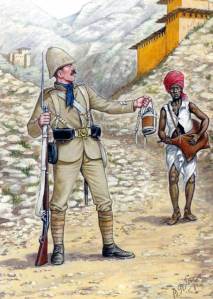
imperialism " during the two stages of Italian imperialism in Eastern Africa was begun at the Liberal end of the 19th century, and the fascist 30s of the 20th century.Both were without reason , bothe were cowardly, both were a betrayal of all that Garibaldi had tried to build.
were a betrayal of all that Garibaldi had tried to build.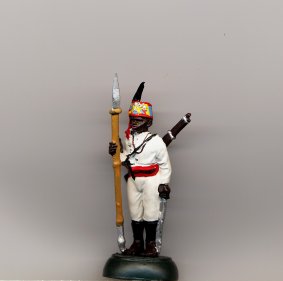
54mm Italian Colonial troop by agostini. this was a two weekly periodical that came with a metal soldier
The Italian army comprised four brigades totalling 17,700 troops, with fifty-six artillery pieces.However, it is likely that even fewer men fought in this battle on the Italian side: Harold Marcus notes that "several thousand" soldiers were needed for support and to guard the lines of communication to the rear, so he estimates the Italian army to have consisted of 14,500 effectives. One brigade under General Albertone was made up of Eritrean askari led by Italian officers.
The remaining three brigades were Italian units under Brigadiers Dabormida, Ellena and Arimondi. While these included elite Bersaglieri, Alpini and Cacciatori units, a large proportion of the troops were inexperienced conscripts recently drafted from metropolitan regiments in Italy into newly formed "di formazione" battalions for service in Africa.
As Chris Prouty describes:
They [the Italians] had inadequate maps, old model guns, poor communication equipment and inferior footgear for the rocky ground. (The newer Remingtons were not issued because Baratieri, under constraints to be economical, wanted to use up the old cartridges.) Morale was low as the veterans were homesick and the newcomers, too inexperienced to have any esprit de corps. There was a shortage of mules and saddles.
If the term imperialism is to be understood it is a very short and limited idea of modernised countries invading the undeveloped.. below alpini hat of adua The Italian Wars that led up to the first world war were between 1880 and 1914, there was limited Italian presence in Africa that got nowhere quite fast, one war was against the turks in Arab libya and before that in Africa . The african campain resulted in the greatest defeat of white men by black men
The Italian Wars that led up to the first world war were between 1880 and 1914, there was limited Italian presence in Africa that got nowhere quite fast, one war was against the turks in Arab libya and before that in Africa . The african campain resulted in the greatest defeat of white men by black men
The great Alpini troops created after the victory over the Italians fought to the end at Adua.These were the finest fighter in most of the world
The fact is that in the socio-political context that serves as the background of the period considered the Italians were already planning not long after the war against Austria expansion into lands that were free and free of European power.

by agostini
ADUAN ALPINO

The colonial image in Italy was that of stupid indigenous populations that had to be controlled, during the first war in Africa, and changed later in the stage of the fascist intervention. The image became "unmentionables" who were lower than the lowest.Native women would do what your wife wouldn't thus the sexual nature of the indigenous women made them even lower than before

The idea of war on a free people didn't really gel with the idea of a liberated Italy attacking a country that was independent but as usual the press sirred up the stupid in exactly the same way as now.
 LENI
LENI
From 1876 to 1896 and from 1930 to 1937 the press were behind all the moves made by a corrupt and incompetant government,as we see now the liars of the press whose favourite two words are "Our Boys" found other phrases to get the minds working , they had their favourite monikers to stir up unjust thought and action amongst the workers and the peasants.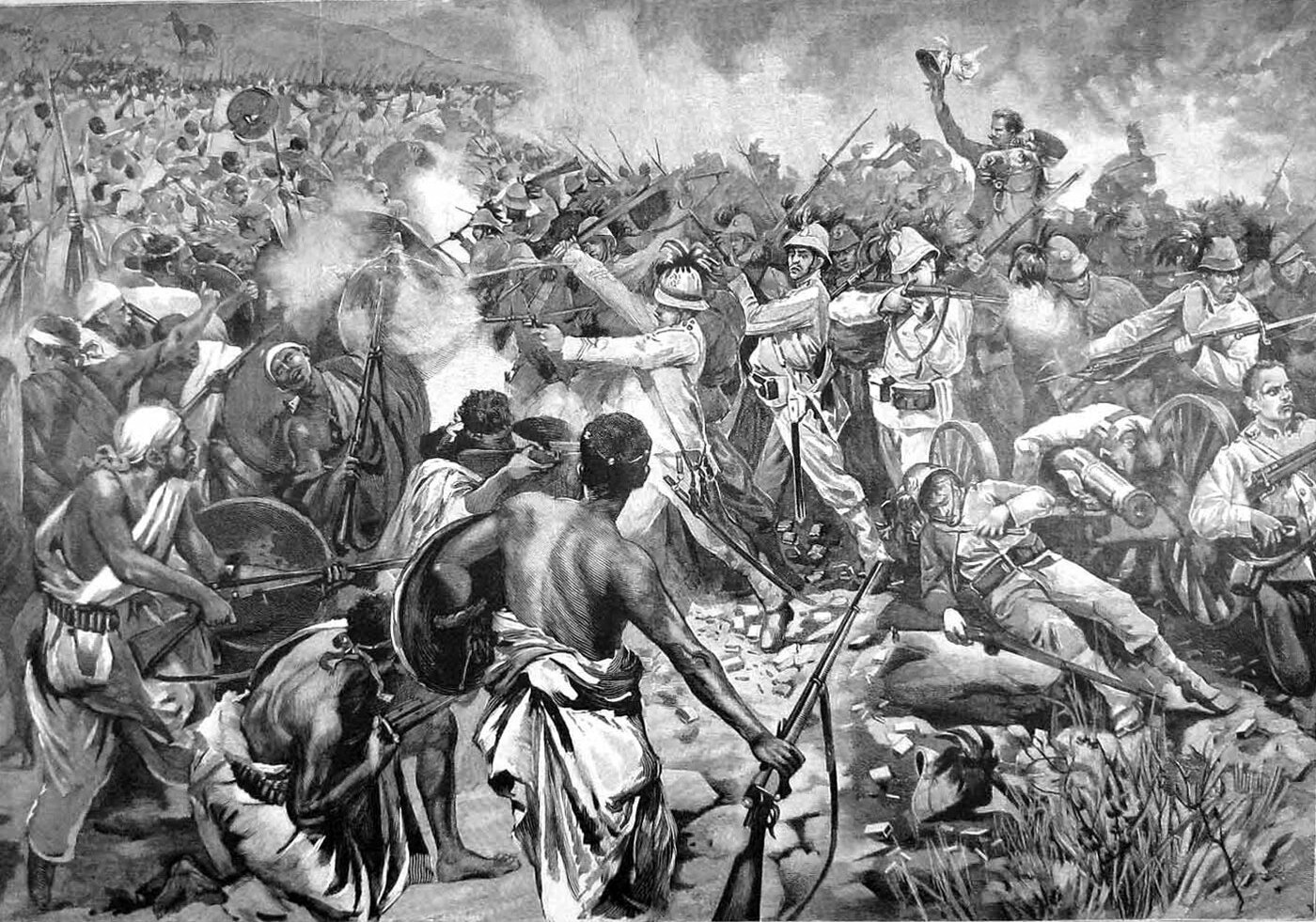
Think fascist and you have a complete picture of the two periods of most Italian commitment in East Africa and the Arab lands.Prisoners were left to rot and there were mass hangings but just let the native do something of the same nature and then you had them screaming for vendetta
![View Smaller Image [Italian colonial infantry, 19th century.]](http://images.nypl.org/index.php?id=831054&t=w)
The Battle of Adwa, was the climax and decisive war of Abyssinia, it took place on 1 March 1896 in the surroundings of the homonymous locality, Italian forces, commanded by Lieutenant General Oreste Baratieri, and the Abyssinian army of negus Menelik II. The Italians suffered a crushing defeat, which stopped for many years their colonial ambitions on the Horn of Africa.the country that had begged the french to help them beat the austrians and which had then more or less pissed on the french when they had their hour of need now invaded a soverign country, this same country would later on abandon their allies the huns in the middle of the second world war. that was the land of the pizza.
The Italians suffered a crushing defeat, which stopped for many years their colonial ambitions on the Horn of Africa.the country that had begged the french to help them beat the austrians and which had then more or less pissed on the french when they had their hour of need now invaded a soverign country, this same country would later on abandon their allies the huns in the middle of the second world war. that was the land of the pizza.
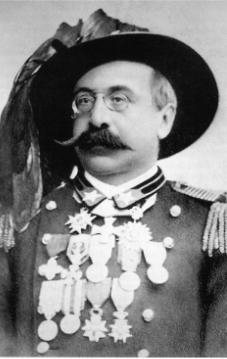
Oreste Baratier
a war had begun in December 1895, when Ethiopian troops attacked the dispersed Italian Presidia in Tigray region, occupied in the April before; the Italians had been taken by surprise, and they were stumbled into a defeat suffered in the battle of Amba Alagi on 7 December. This defeat was on 22 January 1896 ,the Presidium of Mek'ele, who had withstood a siege that lasted two months. Italian forces under the command of General Baratieri, now reinforced by fresh troops arrived from Italy,massed in the area between and Edagà and Amus Adigrat, but the army of Menelik in from behind the enemy and headed into Adua,thus located into an excellent position to attempt the invasion of the Italian colony of Eritrea.
This defeat was on 22 January 1896 ,the Presidium of Mek'ele, who had withstood a siege that lasted two months. Italian forces under the command of General Baratieri, now reinforced by fresh troops arrived from Italy,massed in the area between and Edagà and Amus Adigrat, but the army of Menelik in from behind the enemy and headed into Adua,thus located into an excellent position to attempt the invasion of the Italian colony of Eritrea. artillery hat
artillery hat
Baratieri tried to parry this move by changing the face of his army from South to West, moving his troops in the region of Enticciò and reaching a solid defensive position on monte Saatì on February 7, only a few kilometres from the camp of Ethiopian place in conca di Adwa.
For the next twenty days the two armies faced one another while remaining on their respective positions. The negus took advantage of this downtime to negotiate diplomatic negotiations, coming also to offer an end to hostilities in return for the repeal of the Treaty of Wuchale, whose controversial clauses were one of the causes of war; This request was rejected by the Italian Government, now convinced that only a full military success could restore prestige Italian region . Concerned about the inactivity of Baratieri, Chairman of the Board Francesco Crispi began to encourage the General to get a decisive victory by sending a telegram on 25 February:
«This is a military war; not small skirmishes on which we are always lower than the number in front of the enemy; through a waste of heroism without success. I have no advice to give but I note that the campaign is a misperception but we are ready for any sacrifice to save the honor of the army and the prestige of the monarchy. 
if you want to model the soldiers of the italian colonial army at adua pay close attention to the shape of these hats , make sure you understand the difference with the english one
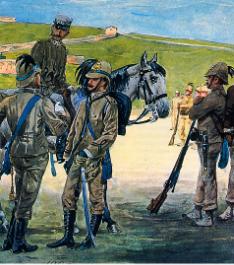
At the same time, however, already by 21 February Crispi had decided to replace Baratieri with General Antonio Baldissera, already Commander of Italian troops in the colony, that he left Italy on February 23, incognito,
was to avoid giving news of his dismissal . thishad deleterious effects on the morale of Baratieri.

these were worn by alpini
Italian movements created a situation where plans were just notions, logistics was meanwhile getting worse, especially for the Italians, in which numerous uprisings erupted and which put in danger the communications with the vital base of Massawa. On February 27, Baratieri gathered together his closest collaborators to discuss the situation: the Chief of staff, Colonel General Giuseppe Valenzano and Arimondi, Matthew Alberton, Vittorio and Giuseppe Dabormida, brigade commanders Ellena. Aware that the army remained with only enough food for four days, Baratieri proposed to operate a strategic retreat in Eritrea, in order to improve logistics and gather new strength; all Generals, however expressed against this plan, proposing instead to attempt an attack on the Ethiopian army, too close to withdraw safely. Baratieri, awaiting more information on the consistency of the enemy army, then he updated the meeting to the next evening
Aware that the army remained with only enough food for four days, Baratieri proposed to operate a strategic retreat in Eritrea, in order to improve logistics and gather new strength; all Generals, however expressed against this plan, proposing instead to attempt an attack on the Ethiopian army, too close to withdraw safely. Baratieri, awaiting more information on the consistency of the enemy army, then he updated the meeting to the next evening 
In the evening between 28 and 29 February, Baratieri reunited again the staff to make informed decisions: the Italian army would not attack directly the Ethiopian positions, which it considered to be too strong, but it would be advanced with the favour of the night to hold a series of hills close to the enemy camp.
Q!mk~$(KGrHqUOKpwE0Vqn+umhBNJK!bot7!~~_12.JPG)
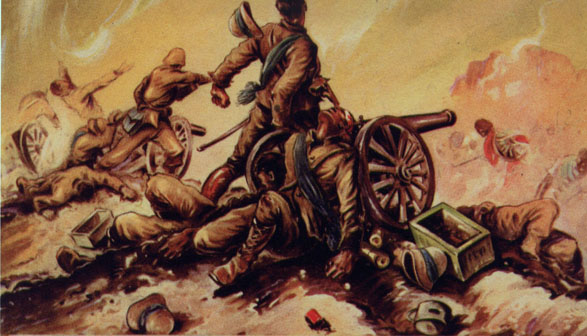
the sicilian battery
--------------------------------------------------------------------------------
CASTAWAY 25mm colonial Italian army contact castaway directly.These are magnificent .
Ho4 Horse $4.15
Ho5 Horse $4.15
Ho6 Horse $4.15
Ho7 Horse $4.15
Ho8 Horse $4.15 (
Ho9 Horse $4.15
IC1 Italiian Officer/sword $2.75
IC2 Italian bugler $2.75
IC3 Ascari NCO $2.75
IC4 Ascari bugler $2.75
IC5 Mounted Italian Officer $2.75
IC6 Lancer bugler $2.75
IC9 Infantry on guard $2.75 (Click on image to view)
IC10 Infantry advancing $2.75 (Click on image to view)
IC11 Infantry firing $2.75 (Click on image to view)
IC12 Infantry standing $2.75 (Click on image to view)
IC13 Ascari on guard $2.75 (Click on image to view)
IC14 Ascari advancing $2.75 (Click on image to view)
IC15 Ascari charging $2.75 (Click on image to view)
IC16 Ascari firing $2.75 (Click on image to view)
IC17 Lancer, arm up $2.75 (Click on image to view)
IC18 Lancer, arm down $2.75 (Click on image to view)
IC19 Bersaglieri, on guard $2.75 (Click on image to view)
IC20 Bersaglieri, standing $2.75 (Click on image to view)
IC21 Cacciatori, advancing $2.75 (Click on image to view)
IC22 Cacciatori, firing $2.75 (
IC23 Italian NCO $2.75
IC24 Officer firing pistol $2.75
IC25 Artillery officer $2.75 ()
IC26 Askari art crew, rammer $2.75
IC27 Askari art crew, standing $2.75
IC28 Askari art crew, kneeling $2.75
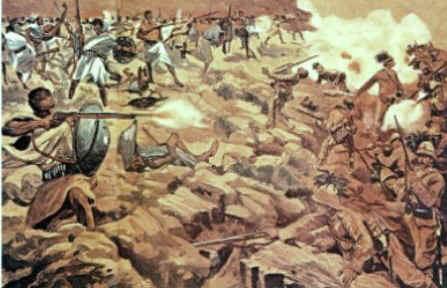

 were a betrayal of all that Garibaldi had tried to build.
were a betrayal of all that Garibaldi had tried to build.
54mm Italian Colonial troop by agostini. this was a two weekly periodical that came with a metal soldier
The Italian army comprised four brigades totalling 17,700 troops, with fifty-six artillery pieces.However, it is likely that even fewer men fought in this battle on the Italian side: Harold Marcus notes that "several thousand" soldiers were needed for support and to guard the lines of communication to the rear, so he estimates the Italian army to have consisted of 14,500 effectives. One brigade under General Albertone was made up of Eritrean askari led by Italian officers.
The remaining three brigades were Italian units under Brigadiers Dabormida, Ellena and Arimondi. While these included elite Bersaglieri, Alpini and Cacciatori units, a large proportion of the troops were inexperienced conscripts recently drafted from metropolitan regiments in Italy into newly formed "di formazione" battalions for service in Africa.
As Chris Prouty describes:
They [the Italians] had inadequate maps, old model guns, poor communication equipment and inferior footgear for the rocky ground. (The newer Remingtons were not issued because Baratieri, under constraints to be economical, wanted to use up the old cartridges.) Morale was low as the veterans were homesick and the newcomers, too inexperienced to have any esprit de corps. There was a shortage of mules and saddles.
If the term imperialism is to be understood it is a very short and limited idea of modernised countries invading the undeveloped.. below alpini hat of adua
 The Italian Wars that led up to the first world war were between 1880 and 1914, there was limited Italian presence in Africa that got nowhere quite fast, one war was against the turks in Arab libya and before that in Africa . The african campain resulted in the greatest defeat of white men by black men
The Italian Wars that led up to the first world war were between 1880 and 1914, there was limited Italian presence in Africa that got nowhere quite fast, one war was against the turks in Arab libya and before that in Africa . The african campain resulted in the greatest defeat of white men by black men
The great Alpini troops created after the victory over the Italians fought to the end at Adua.These were the finest fighter in most of the world
The fact is that in the socio-political context that serves as the background of the period considered the Italians were already planning not long after the war against Austria expansion into lands that were free and free of European power.

by agostini
ADUAN ALPINO

The colonial image in Italy was that of stupid indigenous populations that had to be controlled, during the first war in Africa, and changed later in the stage of the fascist intervention. The image became "unmentionables" who were lower than the lowest.Native women would do what your wife wouldn't thus the sexual nature of the indigenous women made them even lower than before

The idea of war on a free people didn't really gel with the idea of a liberated Italy attacking a country that was independent but as usual the press sirred up the stupid in exactly the same way as now.
 LENI
LENI From 1876 to 1896 and from 1930 to 1937 the press were behind all the moves made by a corrupt and incompetant government,as we see now the liars of the press whose favourite two words are "Our Boys" found other phrases to get the minds working , they had their favourite monikers to stir up unjust thought and action amongst the workers and the peasants.

Think fascist and you have a complete picture of the two periods of most Italian commitment in East Africa and the Arab lands.Prisoners were left to rot and there were mass hangings but just let the native do something of the same nature and then you had them screaming for vendetta
![View Smaller Image [Italian colonial infantry, 19th century.]](http://images.nypl.org/index.php?id=831054&t=w)
The Battle of Adwa, was the climax and decisive war of Abyssinia, it took place on 1 March 1896 in the surroundings of the homonymous locality, Italian forces, commanded by Lieutenant General Oreste Baratieri, and the Abyssinian army of negus Menelik II.
 The Italians suffered a crushing defeat, which stopped for many years their colonial ambitions on the Horn of Africa.the country that had begged the french to help them beat the austrians and which had then more or less pissed on the french when they had their hour of need now invaded a soverign country, this same country would later on abandon their allies the huns in the middle of the second world war. that was the land of the pizza.
The Italians suffered a crushing defeat, which stopped for many years their colonial ambitions on the Horn of Africa.the country that had begged the french to help them beat the austrians and which had then more or less pissed on the french when they had their hour of need now invaded a soverign country, this same country would later on abandon their allies the huns in the middle of the second world war. that was the land of the pizza.
Oreste Baratier
a war had begun in December 1895, when Ethiopian troops attacked the dispersed Italian Presidia in Tigray region, occupied in the April before; the Italians had been taken by surprise, and they were stumbled into a defeat suffered in the battle of Amba Alagi on 7 December.
 This defeat was on 22 January 1896 ,the Presidium of Mek'ele, who had withstood a siege that lasted two months. Italian forces under the command of General Baratieri, now reinforced by fresh troops arrived from Italy,massed in the area between and Edagà and Amus Adigrat, but the army of Menelik in from behind the enemy and headed into Adua,thus located into an excellent position to attempt the invasion of the Italian colony of Eritrea.
This defeat was on 22 January 1896 ,the Presidium of Mek'ele, who had withstood a siege that lasted two months. Italian forces under the command of General Baratieri, now reinforced by fresh troops arrived from Italy,massed in the area between and Edagà and Amus Adigrat, but the army of Menelik in from behind the enemy and headed into Adua,thus located into an excellent position to attempt the invasion of the Italian colony of Eritrea. artillery hat
artillery hatBaratieri tried to parry this move by changing the face of his army from South to West, moving his troops in the region of Enticciò and reaching a solid defensive position on monte Saatì on February 7, only a few kilometres from the camp of Ethiopian place in conca di Adwa.
For the next twenty days the two armies faced one another while remaining on their respective positions. The negus took advantage of this downtime to negotiate diplomatic negotiations, coming also to offer an end to hostilities in return for the repeal of the Treaty of Wuchale, whose controversial clauses were one of the causes of war; This request was rejected by the Italian Government, now convinced that only a full military success could restore prestige Italian region . Concerned about the inactivity of Baratieri, Chairman of the Board Francesco Crispi began to encourage the General to get a decisive victory by sending a telegram on 25 February:

if you want to model the soldiers of the italian colonial army at adua pay close attention to the shape of these hats , make sure you understand the difference with the english one

At the same time, however, already by 21 February Crispi had decided to replace Baratieri with General Antonio Baldissera, already Commander of Italian troops in the colony, that he left Italy on February 23, incognito,
was to avoid giving news of his dismissal . thishad deleterious effects on the morale of Baratieri.

these were worn by alpini
Italian movements created a situation where plans were just notions, logistics was meanwhile getting worse, especially for the Italians, in which numerous uprisings erupted and which put in danger the communications with the vital base of Massawa. On February 27, Baratieri gathered together his closest collaborators to discuss the situation: the Chief of staff, Colonel General Giuseppe Valenzano and Arimondi, Matthew Alberton, Vittorio and Giuseppe Dabormida, brigade commanders Ellena.
 Aware that the army remained with only enough food for four days, Baratieri proposed to operate a strategic retreat in Eritrea, in order to improve logistics and gather new strength; all Generals, however expressed against this plan, proposing instead to attempt an attack on the Ethiopian army, too close to withdraw safely. Baratieri, awaiting more information on the consistency of the enemy army, then he updated the meeting to the next evening
Aware that the army remained with only enough food for four days, Baratieri proposed to operate a strategic retreat in Eritrea, in order to improve logistics and gather new strength; all Generals, however expressed against this plan, proposing instead to attempt an attack on the Ethiopian army, too close to withdraw safely. Baratieri, awaiting more information on the consistency of the enemy army, then he updated the meeting to the next evening 
In the evening between 28 and 29 February, Baratieri reunited again the staff to make informed decisions: the Italian army would not attack directly the Ethiopian positions, which it considered to be too strong, but it would be advanced with the favour of the night to hold a series of hills close to the enemy camp.

the sicilian battery
--------------------------------------------------------------------------------
CASTAWAY 25mm colonial Italian army contact castaway directly.These are magnificent .

Ho4 Horse $4.15
Ho5 Horse $4.15
Ho6 Horse $4.15
Ho7 Horse $4.15
Ho8 Horse $4.15 (
Ho9 Horse $4.15
IC1 Italiian Officer/sword $2.75
IC2 Italian bugler $2.75
IC3 Ascari NCO $2.75
IC4 Ascari bugler $2.75
IC5 Mounted Italian Officer $2.75
IC6 Lancer bugler $2.75
IC9 Infantry on guard $2.75 (Click on image to view)
IC10 Infantry advancing $2.75 (Click on image to view)
IC11 Infantry firing $2.75 (Click on image to view)
IC12 Infantry standing $2.75 (Click on image to view)
IC13 Ascari on guard $2.75 (Click on image to view)
IC14 Ascari advancing $2.75 (Click on image to view)
IC15 Ascari charging $2.75 (Click on image to view)
IC16 Ascari firing $2.75 (Click on image to view)
IC17 Lancer, arm up $2.75 (Click on image to view)
IC18 Lancer, arm down $2.75 (Click on image to view)
IC19 Bersaglieri, on guard $2.75 (Click on image to view)
IC20 Bersaglieri, standing $2.75 (Click on image to view)
IC21 Cacciatori, advancing $2.75 (Click on image to view)
IC22 Cacciatori, firing $2.75 (
IC23 Italian NCO $2.75
IC24 Officer firing pistol $2.75
IC25 Artillery officer $2.75 ()
IC26 Askari art crew, rammer $2.75
IC27 Askari art crew, standing $2.75
IC28 Askari art crew, kneeling $2.75

No comments:
Post a Comment